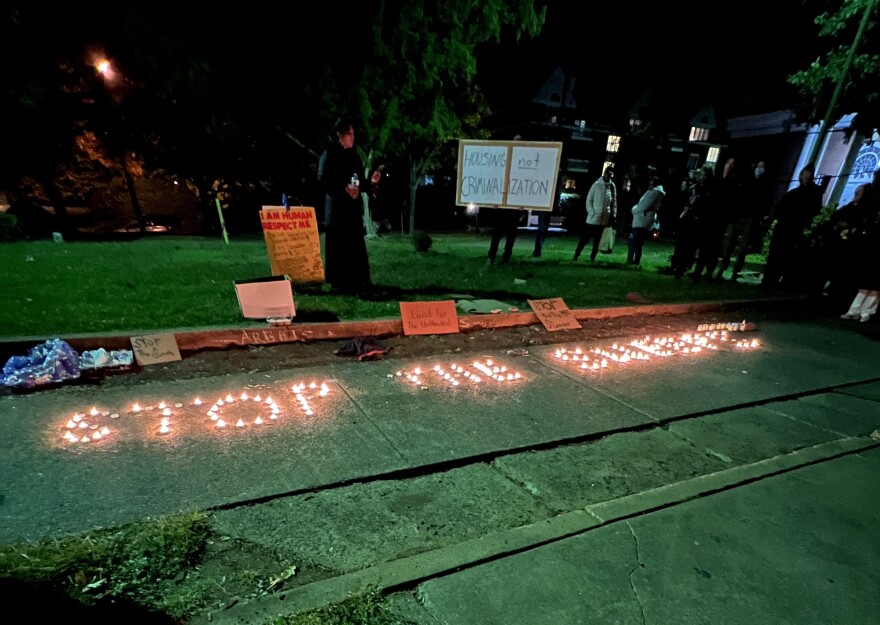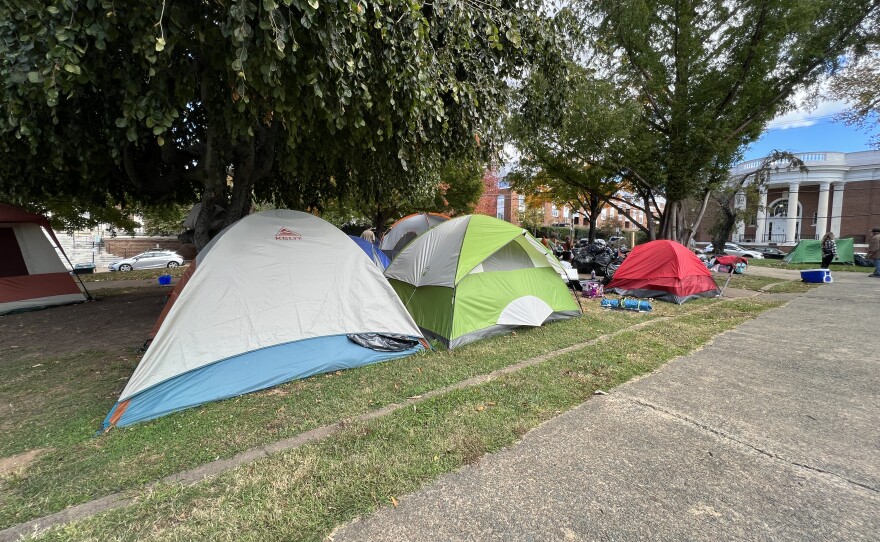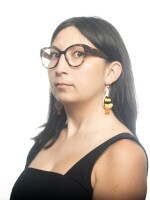Although unhoused people aren't uncommon on Charlottesville’s mall, encampments — at least in this part of Virginia — typically aren't on a main drag in a touristy downtown area. And up until Saturday night, signs of the city’s growing unhoused population were highly visible at Market Street Park.
Generally, the park is open from 6 a.m. to 11 p.m. A weekslong lift of the park’s curfew was in effect as a short-term solution ahead of opening Charlottesville’s overnight shelters for the changing seasons. And during an Oct. 2 City Council meeting, 10 days after the curfew had been lifted, City Manager Sam Sanders presented a work plan to the public as part of a homeless intervention program.
“I understand we have never had a comprehensive plan for addressing homelessness, and I now commit to seeing one get built,” he said.
But the curfew returned roughly a month after it was initially lifted, causing residents of the park to seek out new accommodations for the nights — and forcing local shelters to open ahead of schedule. During the morning and afternoon hours of Oct. 21, residents helped one another pack up belongings ahead of the reimposed curfew.
Editor’s note: VPM News spoke with several former Market Street Park residents, as well as multiple unhoused residents. These sources shared their experiences on the condition of partial or complete anonymity in published material.
“You understand that this is a community because they have each other,” said Roscoe, one of the park’s former residents.
Luis Oyola, director of organizing with the Legal Aid Justice Center, said he’s been trying to help some of the people living in the park during his personal time. In an email exchange with VPM News, Oyola said the organization has been doing “direct advocacy with city councilors” and had pushed council to delay the curfew’s enforcement.
To Oyola, there’s a lot the city could do to try and ease the problem.
“Financial support and proper staffing for rapid rehousing programs is key here, because that support provides just enough stability to reduce the risks of someone ending up back in the streets,” he said.
He talked about the possibility of people being around town and not in the way of anyone enjoying the Downtown Mall or using spaces safely, which could cause them to become targets for trespassing. From there, he said, a feedback loop begins: possible incarceration, a criminal record and then further complications when trying to find employment or housing.
“If people sleep on the Downtown Mall, they are made to leave. If they move to the parks surrounding the Downtown Mall, they are made to leave. If they go to abandoned buildings, they are made to leave. If they go to random patches of wood, they are made to leave,” he said.
People and Congregations Engaged in Ministry is one of the groups helping the city’s unhoused population. It opened its shelter doors a week early for the upcoming season because of the encampment at the park. The Haven, a day shelter across the street from the park, is another organization that’s been trying to help unhoused residents.
In a statement emailed to VPM News on Saturday, the Haven wrote, “criminalizing those without homes will only exacerbate the problem of homelessness because having a criminal record makes securing housing more difficult.”
The shelter recognizes that there is not a lot of citywide capacity for unhoused residents; it estimated that Charlottesville is starting this shelter season with 33 fewer beds than were available at the end of last year’s.
Charlottesville previously had another source to help the unhoused population: Premier Circle, which closed in June 2023. As Charlottesville Tomorrow reports, more than 100 people had taken shelter in the two years that it was open. Premier Circle was created from an old Red Carpet Inn on U.S. Route 29 that was purchased by the Piedmont Housing Alliance, with the help of a $4.25-million grant from the Charlottesville Area Community Foundation.
When it opened in 2021, Charlottesville Tomorrow reported that the site was set to “be used for a yearslong multi-phase project that will aim to solve chronic homelessness and other types of housing issues in the area.”
“Funding can be reprioritized to find housing for those currently camped in Market Street Park,” The Haven wrote in an email to VPM News. “This requires not only housing resources but staff to support access to housing. Shelter is temporary and necessary, but the need for affordable housing – including permanent supportive housing remains.”
The statement also referenced rising housing costs, as well as a lack of affordable housing. Cities across the country, including Richmond, are dealing with those issues.
'There’s a lot of people struggling. Homelessness isn’t just one face of it.'
At the park, a woman who identified as Grace said she noted “a gap between poor people and wealthy people.”
She also said the middle class is being driven out of Charlottesville, mirroring points seen in The Haven’s statement: “You’re either going to have to work yourself nonstop, work yourself to death to stay afloat [and] maintain your lifestyle, or have already inherited some wealth or accumulated some wealth where you can live comfortably.”
To remain comfortable, Grace said, people are making sacrifices for their families — even if it means working so much that kids don't see their parents regularly. As someone who works with children on a full-time basis, she’s personally seen the effects trying to keep a family afloat.
“I see how it really impacts the kids who do not have their parents available to them, because they’re working so much it’s affecting their behavior; their psychological and emotional well-being,” Grace said.
The park’s residents come from all walks of life. One said he was a 25-year combat veteran who has been trying to raise awareness around veteran suicides.
Some residents said they weren’t staying at PACEM or the Salvation Army because of their pets or discomfort with dormitory-style housing.
LAJC organizer Oyola said some people have run into barricades trying to find safe, stable shelter because “they either don't have enough space or have rules in place that keep them out in the first place.”
Both PACEM and The Haven have worked with Charlottesville’s government for years to help ease the housing situation. The Haven’s statement also mentioned “successful interventions,” including short-term sheltering by the Salvation Army and PACEM.
Other interventions include rapid housing efforts from The Haven, as well as The Crossings, a permanent supportive housing community for people who were previously homeless. It also serves as a mixed-income community, with spots allotted for people whose incomes fall below 50% or less of the region’s area median income.
PACEM did not respond to requests for comments by the time this article was published.

Some of the city’s unhoused residents, including Grace, want to work on getting better outreach for people in the community, including helping with coping or reactivity skills — “when you’re in a situation that’s escalating to an argument.”
“I was thinking of just having some kind of class or workshop where they could meet regularly for free at The Haven,” she said.
Roscoe, the former Market Street Park resident, had a similar sentiment. He used to sleep on the Downtown Mall, but was trying to be respectful of others while there.
“We want to be able to invest back into the economy; we want to be able to assist in Charlottesville’s growth,” he said. “Economically, we want to be a part of the system. Most of us have ideas that can help the economy grow.”
He said various communities in Charlottesville have their own ideas about ways to help the unhoused, people who are coming home from prison and people who survive on low incomes.
Roscoe added that people “just fall on hard times,” when not everyone is addicted to drugs or has problems with their mental health. There are many ways people can end up unhoused, and it can take years to rebuild from that.
“There’s a lot of people struggling,” he said. “Homelessness isn’t just one face of it.”
In September, he reached out to business owners on the Mall and Charlottesville City Council. He wanted to share some of the concepts he would like to see benefit the community, but nobody showed up to hear what he had to say. After he reached out to city leaders, Roscoe figured he needed to do something “extreme” to be heard.
When CPD officers came to enforce Market Street Park’s curfew in September, he protested. And according to several people at the park on Saturday, his arrest was the reason the curfew was temporarily lifted: “I sat down in a chair and put [up] a sign that I had previously made. I said ‘make room for homeless people,’ and that’s how all of this got started.”
'Stop the Sweep'
At 9 p.m. Saturday night, people gathered in Market Street Park for the “Housing Not Criminalization” protest against the city’s decision to lift the curfew. On the sidewalk, tea light candles spelled out “stop the sweep,” referencing the police sweeps that had taken place before the curfew was temporarily lifted.
After residents finished packing their belongings, several community activists spoke about how the members of the Market Street Park community were going to be isolated from one another moving forward.
Activist Rosia Parker said that when she moved to Charlottesville, she was homeless for five years before finding public housing. Another community activist talked about becoming homeless in Charlottesville right before the COVID-19 pandemic. Prior to that, she said she had been living in housing that had black mold.
Protesters also marched through the Downtown Mall. Shouts of “housing not jail” and “no justice, no peace” could be heard throughout the night.
LAJC organizer Oyola said he would like to see Charlottesville stop criminalizing people for trying to find a place to sleep, especially when there’s no alternative.
He put it this way: “The best answer to ‘How did we get to where we are today?’ is another question: ‘Where else are people supposed to go?’”



